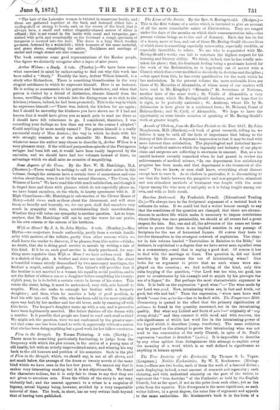Bacchus Dethroned. By Frederick Powell. (Educational Trading Co.)—We always turn
to the Scriptural argument of a teetotal book to estimate its value. If we eould but find a writer honest enough to say that the conditions of the question are changed, that there are circum- stances in modern life which make it necessary to impose restrictions where liberty was once permissible, we should at all events feel a great respect for him. But, one and all, the advocates of the cause set them- selves to prove that there is no implied sanction in any passage of Scripture for the use of fermented liquors. Of course they have to involve themselves in the strangest network of sophistries. The chap- ter in this volume headed "Teetotalism in Relation to the Bible," for instance, is sophistical to a degree that we have never seen equalled even in a corameotary,—and that is saying a good deal. Of course it has to deal with the marriage at Cana. The question is, did our Lord sanction by His presence the use of intoxicating wines ? One looks for an argument to prove that no such wines were em- ployed on the occasion ; we find nothing of the kind, only this oalm begging of the question, "Our Lord was too wise, too good, too pure to countenance by his example and to enjoin by his precepts the use of a liquor," &c. But perhaps the most characteristic argument is this. It ia built on the expression "good wine :"—" The wine made by our Lord was good. Now, intoxicating wines are, in fact and truth, not good, but vile and bad." Then the expression, "when men have well drunk "—aft/ AWY tzsgue-.Gn —has to be dealt with. The Temperance Bible Commentary is quoted to the effect that the primary signification of itseliirosur is found in the quantity consumed, not in the intoxicating quality. But what say Liddell and Scott of piOu?—" originally of 'any strong drink 1 " and they connect it with mead, and with temetum, the
sole significance of which last word lies in the intoxicating power of he liquid which it describes (comp. temulentus). The same criticism may be passed on the attempt to prove that intoxicating wine was not used in the communion of the early Church, in spite of St. Paul's expression "another is drunken "(at/in). It is impossible to describe by any other epithet than disingenuous this attempt to explain away the meaning of a word which is as well defined in significance as anything in human speech.


































 Previous page
Previous page